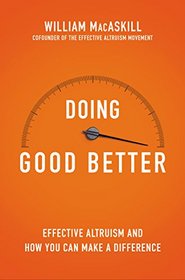Search -
Doing Good Better: Effective Altruism and How You Can Make a Difference
Doing Good Better Effective Altruism and How You Can Make a Difference
Author:
An up-and-coming visionary in the world of philanthropy and cofounder of the effective altruism movement explains why most of our ideas about how to make a difference are wrong and presents a counterintuitive way to think about how each of us can do the most good possible. — — Most of us wish we could make a difference in the world. We donate ou... more »
Author:
An up-and-coming visionary in the world of philanthropy and cofounder of the effective altruism movement explains why most of our ideas about how to make a difference are wrong and presents a counterintuitive way to think about how each of us can do the most good possible. — — Most of us wish we could make a difference in the world. We donate ou... more »
The Market's bargain prices are even better for Paperbackswap club members!
Retail Price: Buy New (Hardcover): $19.09 (save 29%) or
Become a PBS member and pay $15.19+1 PBS book credit
![header=[] body=[Get a free book credit right now by joining the club and listing 5 books you have and are willing to share with other members!] Help icon](/images/question.gif?v=52444873) (save 43%)
(save 43%)ISBN-13: 9781592409105
ISBN-10: 1592409105
Publication Date: 8/4/2015
Pages: 272
Rating: ?
ISBN-10: 1592409105
Publication Date: 8/4/2015
Pages: 272
Rating: ?
0 stars, based on 0 rating
Genres:




